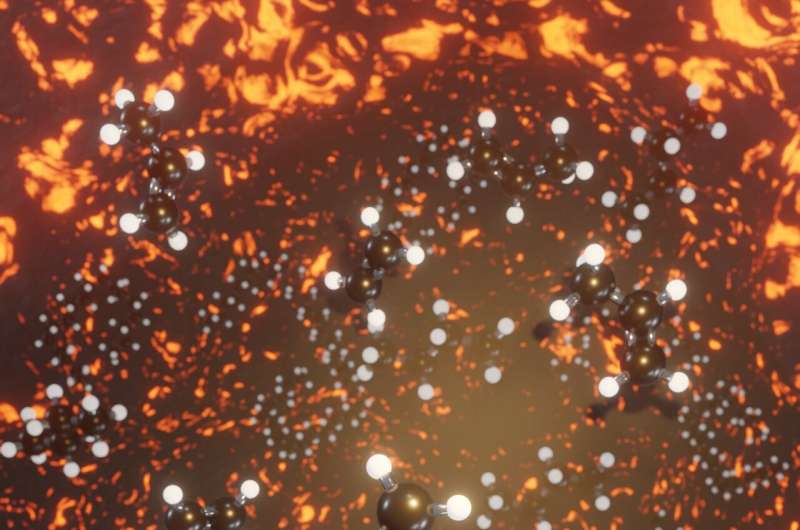This article has been reviewed according to Science X's editorial process and policies. Editors have highlighted the following attributes while ensuring the content's credibility:
fact-checked
trusted source
proofread
Advancing chemical recycling of waste plastics: A computational approach for predicting product distributions

It's lightweight, low-cost, almost endlessly customizable, and concerningly ubiquitous: For all its benefits, plastic—and plastic waste—is a big problem. Unlike glass, which is infinitely recyclable, plastic recycling is challenging and expensive because of the material's complex molecular structure designed for specific needs.
Globally, an estimated 380 million metric tons of plastic is produced every year. However, only about 9 percent of all plastic waste is recycled, about 12 percent is incinerated, and the rest is discarded in landfills and the natural environment.
New research from the lab of Giannis Mpoumpakis, associate professor of chemical and petroleum engineering at the University of Pittsburgh, focuses on optimizing a promising technology called pyrolysis, which can chemically recycle waste plastics into more valuable chemicals. The paper was published recently and featured on the cover of the Journal of Chemical Theory and Computation.
"Pyrolysis is relatively low in cost and can generate high-value products, so it presents an appealing, practical solution," said Mpourmpakis. "It has already been developed on a commercial scale. The main challenge now is finding optimal operating conditions, given the starting and final chemical products, without needing to rely heavily on trial-and-error experimentation."
To optimize pyrolysis conditions and produce desired products, researchers typically use thermodynamic calculations based on what's known as the Gibbs free energy minimization approach. However, the lack of thermochemical data can limit the accuracy of these calculations.
While density functional theory (DFT) calculations are commonly used to obtain precise thermochemical data for small molecules, their application becomes challenging and computationally expensive for the large, flexible molecules that make up waste plastics, especially at elevated temperatures of pyrolysis.
In this study, Mpourmpakis and former postdoc Hyunguk Kwon, who is now a professor at Seoul National University of Science and Technology, developed a computational framework to accurately calculate the temperature-dependent thermochemistry of large and flexible molecules.
This framework combines conformational search, DFT calculations, thermochemical corrections, and Boltzmann statistics; the resulting thermochemistry data is used to predict the thermal decomposition profiles of octadecane, a model compound representing polyethylene.
The proposed computational analysis based on first principles offers a significant advancement in predicting temperature-dependent product distributions from plastic pyrolysis. It can guide future experimental efforts in chemical plastic recycling, enabling researchers to optimize pyrolysis conditions and increase the efficiency of converting waste plastics into valuable chemicals.
"The production of plastics is expected to keep increasing, so it's essential that we find and perfect ways to recycle and reuse plastics without harming the environment," said Mpourmpakis. "This work … contributes to the development of sustainable waste management strategies and the reduction of plastic pollution, offering potential benefits for both the environment and society."
More information: Hyunguk Kwon et al, Ab Initio Thermochemistry of Highly Flexible Molecules for Thermal Decomposition Analysis, Journal of Chemical Theory and Computation (2023). DOI: 10.1021/acs.jctc.3c00265
Provided by University of Pittsburgh





















